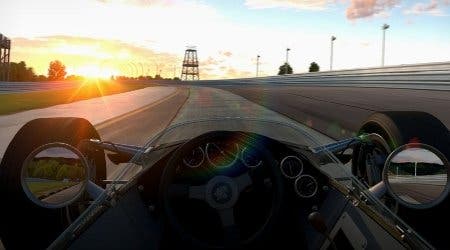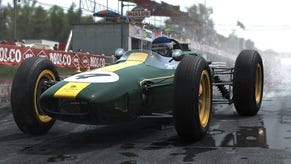Project Cars Preview
We're in this one together.
We're a fussy bunch, really. Soon after a game's release and public forums become autopsy slabs, full of should have, would have, could have. It's at this point in a game's life cycle, once the hype has blown away and after the controller's been put down, that everyone becomes a game designer; everyone knows how to make a game better.
Project Cars, Shift developer Slightly Mad Studio's latest project, inverts the process. Here, it's those suggestions, that nitpicking and those moments of fan inspiration that are being harvested for a game that's bravely decided to do much of its growing up in public.
It's all quite simple; sign up to WMD, the somewhat unfortunate acronym chosen for Slightly Mad's World of Mass Development platform, and you're granted access to regularly released builds of the game, which you're then free to pick apart in the official forums. That feedback then gets absorbed by Slightly Mad Studios, a simple loop that means that, when the game is eventually released, it'll be as much a product of the community as it is of the studio.
"The whole point of WMD was creating a game where you're listening more to the fans than you are to the publisher," says Slightly Mad's creative director Andy Tudor - and it's hard not to start wondering how working with EA on the ever-shifting Need for Speed brand may have provided the catalyst for such an open-armed approach to development.
"I don't want to suggest that publishers are evil," Tudor continues, "but we'd rather ask the community what cars they want in the game and what tracks they want in the game, and then we know that the game we're making is the one that these people want to buy."
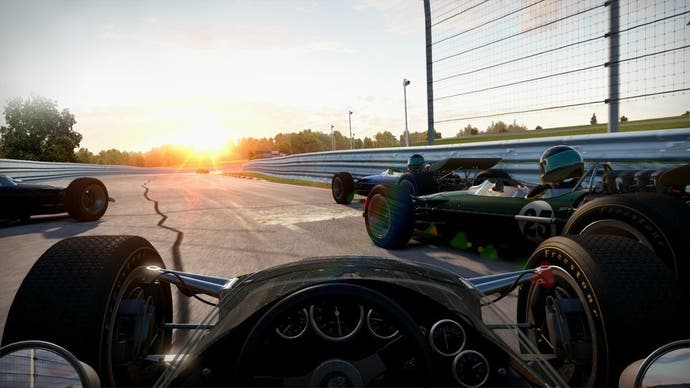
"In normal development you arrange all your design features," explains producer Suzy Wallace, "and then you get to post-alpha and you get some feedback on what real gamers think of your game. By then, you can make tweaks but you can't really change any kind of big design pillars. The whole idea was to get people involved right from the beginning."
For all of its novelty there's a solid logic underpinning Project Cars' unique approach to development, and while it's far from traditional the benefits are clear. "The great thing about having the community involved is all the feedback," says Wallace, "It's like having a focus group all of the time."
It's to be shaped by those who are playing it, then, and there's a stirring spirit of democracy to the whole process - even if it is, understandably, a democracy built around a financial framework. There are tiered memberships available, with bigger investment buying you a bigger voice, but once the finished product releases there'll be bigger rewards too, with proceeds from the final released product to be split 70/30 in the community's favour.
How that finished product makes it to the market remains in-flux. For now, it's set to be a free-to-play PC game, powered by micro-transactions that will, Slightly Mad says, be competitively pitched, undercutting its competitors in what they're calling a supermarket pricing philosophy. There's the intention of having it come to console too, with Xbox 360, PlayStation 3 and Wii U versions currently slated - which suggests a boxed copy when the project nears completion in 2013, an idea that Slightly Mad isn't entirely averse to.
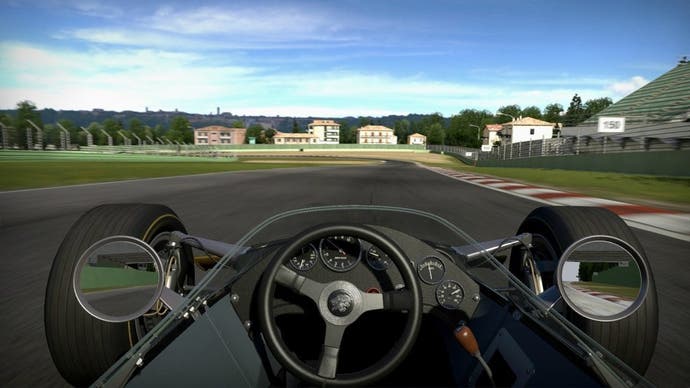
We've an apocalypse and an Olympics to get through before then, but with builds being distributed on a weekly basis Cars can be played this very second if you so desire. It's light on content but otherwise feels surprisingly complete - though that's perhaps no real shock given that it's built upon the foundations of the technically adept Shift series. "We're using the same engine, but we're adding to it," says Tudor, "It's supposed to be modular so there are things like weather, streaming and all that stuff that is being added to this game. We didn't need to start from scratch again."
So what you're getting right now is a handsome racer that's inherited some of the attributes of the Shift games that preceded it. Thankfully for some, it's also jettisoned some of the excesses of those games, and in feel and spirit what's here feels closer to GTR 2, Slightly Mad's more sim-minded predecessor, than its work with EA.
The nervousness of Shift's cars is still there, though it's been toned down to make for what feels like a much more authentic ride, savage enough to punish but smooth enough to really engage with. "There's this illusion that to be a hardcore sim you have to be nearly impossible to drive," says Wallace, a veteran of track days across the country, "I don't think that's necessarily true - otherwise the roads would be a terrifying place. Cars are not that hard to drive on track until you start getting them to the limits."
One of Project Cars' big draws is the variety of machinery whose limits it allows you to explore. Licenses are currently being explored, and while there's some already in place - Caterham, Aerial Motors and the Gumpert Apollo are all confirmed, while on the track side Motorsport Visions will be bringing its UK quartet of Brands Hatch, Snetterton, Oulton Park and Cadwell Park - it's the fictional pairings that suggest where the real appeal may lie.
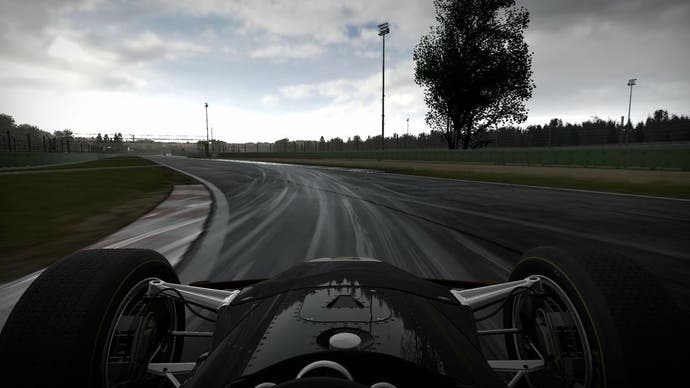
A thinly veiled Lotus 49 offers a thrilling ride around a track that's Watkins Glen in all but name, while elsewhere a take on the Lotus 98T pounds around a Bologna track that mimics Italy's Imola circuit. There are more modern machines too; a Formula B car provides a more contemporary open-wheeled experience, and there are recognizable variations on Audi's DTM tourer and its R18 TDI.
Such diversity is what the career mode's built on, and Slightly Mad's looking to create a single-player mode as compelling as anything seen since Codemasters' excellent Grid. Governed by an in-game calendar, you'll have to manage your career, starting off in karts and choosing whether you progress into tin-tops, single-seaters or off-roaders. "Basically, there are no stars, there's no XP - there's none of the traditional gamey things," assures Tudor, "We said the way to do an authentic racing game is to look and do what real racing drivers do."
As it stands it's an impressive racer, but of course the really exciting part is how much more is to come - and, more precisely, how what's to come is in the hands of the game's community. "People have a voice here, and the game's not finished," says Tudor, "If they want a feature, tell us and we'll look into doing it." Project Cars could well be one of the best racers of recent years - and whether it is or not is largely down to those that choose to support it.
